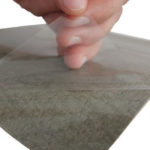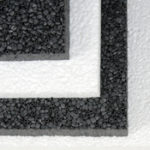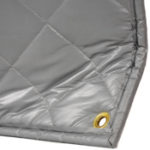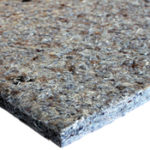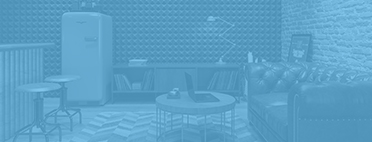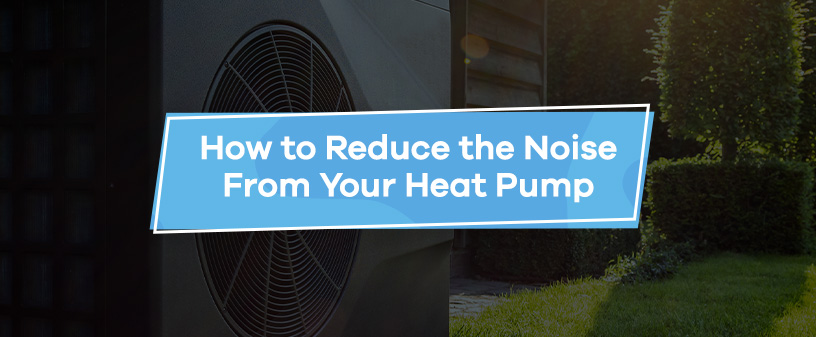
When a heat pump is noisy, the vibrating and clanking can affect your peace and disrupt your sleep. Learning how to reduce the noise from your heat pump can lower the level of sounds that come out of that area.
What Causes Heat Pump Noises?
Heat pumps produce low-frequency vibrational noise that can cause udder chaos when you are trying to watch TV or work. There are three major types of heat pump noise.
1. Mid-High Frequency Broadband Noise
These deep vibrations and ticking sounds come from air-source fans. Enclosures can successfully reduce the noise, but they also reduce the efficiency of the heat pump.
2. Heat Pump Hum
These low-frequency noises can occur as a result of electromagnetic excitation, out-of-balance fans or pump frequencies. If your heat pump is making a loud noise, tonal frequencies will pass through easily and can be particularly challenging to treat.
3. Heat Pump Vibration
Loud heat pump vibration is typically caused by installing heat pumps onto buildings, which causes the vibrations to transfer into the structure. Some building features, like a flat roof, can create a loudspeaker effect that causes the vibrating noise to travel inside and outside the area.
How to Soundproof Your Heat Pump
Heat pump soundproofing techniques depend on the cause of the noise, and regular maintenance can often prevent sounds from becoming unbearable. If you want to reduce sounds further, you have a couple of options you can apply to achieve noise reduction.
Reduce Vibrations
Pipes around the heat pump can cause rattling vibrations that travel throughout your home. You can dampen the vibrations by wrapping Soundproof Cow’s Vibra Block® Sound Deadening Material around the pipes. These sheets are easy to apply with a peel-and-stick adhesive that effectively reduces the pipes’ vibrating sounds.
Soundproof Cow products containing polyurethane foam are not available in California. If you live in The Golden State, acoustic panels like the Quiet Board™ Water-Resistant Panels also reduce vibrational noises. They have powerful absorbing capabilities, so when sound waves hit them, they do not find their way out.
Sometimes, the vibration can be worse when the pipes vibrate off the walls. This causes a clanking sound, which intensifies the noise. To put a stop to these noises, place something absorptive between the pipes and the wall. The Quiet Barrier® MD Soundproofing Composite is an excellent product for this problem.
Aside from vibrating off the walls, the pipes can also vibrate off the ground, causing annoying thumping noises. In this scenario, you should place something to cushion it and ensure the pipes do not clang against the floor. Depending on your heat pump, you could use the Echo Absorber™ Acoustic Cotton Panels to create a cushion layer between the floor and pipes.
The pipes are not the only cause of vibrations. The heat pump compressor may rattle from the inside, especially if your pump is older. In this case, you want to reduce the sound from the inside. You can use a soundproof blanket made with Quiet Barrier® soundproofing material to prevent the noise from transmitting outside. Ensure it is compatible with your heat pump before use.
Make sure that the compressor is working properly and that the blanket is not in the way of any elements that affect the heat pump’s functioning.
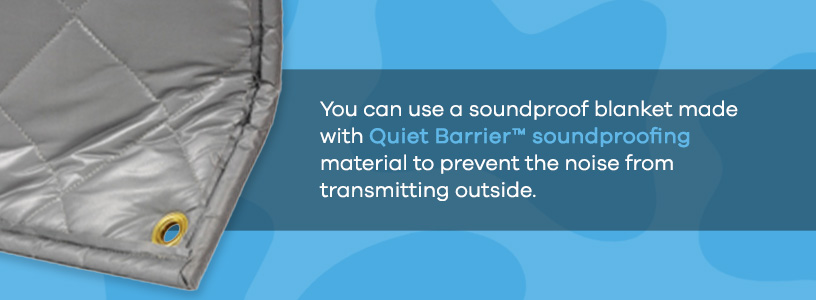
Block Sound
There are two main ways to block sounds — you could soundproof the heat pump or soundproof the areas outside of it.
If the heat pump is located near your windows or outside your house, consider soundproofing it. The best way to do this is to construct an anti-noise box. It will allow air to circulate around the machine but also block most of the noise. Note that you must consult a professional before doing this, as it may affect the performance of certain heat pumps.
The anti-noise box covers the heat pump and redirects the vibrational sound waves. You will need essential soundproofing materials to build an effective noise-reducing casing, including:
- Medium-density fiberboard.
- Mass-loaded vinyl.
- Acoustic foam.
- Ventilation duct.
- Acoustical sound sealant.
Constructing the box is similar to building a soundproof generator box, but you should always consult a professional. Soundproof Cow also offers a free acoustic analysis, so you can get advice on heat pump soundproofing.
Aside from noise-blocking, a soundproof box can also enhance the aesthetic of your space by hiding the heat pump. It is often more aesthetically pleasing than the pump itself, and you can remove it by simply lifting it off whenever your heat pump requires maintenance.
If soundproofing the heat pump is not your style — or your heat pump is inside — you can soundproof the rooms or areas outside of it. This can help improve the acoustics in the room, allowing people to hear each other better and minimizing heat pump noise.
One way to effectively soundproof an area is using our Udderly Quiet® Acoustic Panel, which improves speech intelligibility. It can be especially beneficial if the heat pump noise frequently affects a social space like a living room.
The most effective way to reduce noise from a heat pump is to learn how to soundproof both the heat pump and the other affected areas. These machines can not be totally concealed without impacting functionality, so some noise will still escape, but soundproofing the other areas can reduce external noise by amplifying the internal area.
Heat Pumps Should Be Seen, Not Herd: Find Peace With Soundproof Cow
Heat pumps typically make vibrating noises, which can cause clanking pipes and loud, pesky noises that travel into other rooms. Soundproof Cow can help you find solutions so the silence will be moo-sic to your ears. We take a solutions-based approach to get to know more about your situation and help you decide on the best possible product. Our resources simplify the complexities of acoustics by providing user-friendly guides and advice.
We value our customers and take pride in giving back to our community. We offer a 10% forever sale to active service members and veterans, and our Moola Savers collection helps ensure anyone can enjoy the peace and quiet that our products bring. You can reach out to us for advice or shop our residential DIY soundproofing products.





